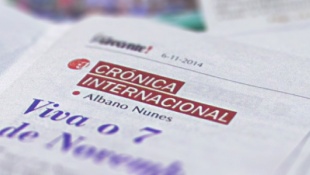Article by Angelo Alves, member of the Political Committee and of the International Department
The liberation of Carla Rojas and Consuelo Gonzales by the Revolutionary Armed Forces of Colombia (FARC), is of great importance, both for the development of the political/military situation in Colombia and for a more wider political point of view, namely in Latin-America.
Primarily, because the FARC unilateral decision of liberating two of their prisoners is an unequivocal sign of the Colombian guerrilla availability towards negotiation. A behaviour which, within the framework of the Uribe’s regime concrete refusal in negotiating any kind of a humanitarian agreement with the FARC, reveals FARC’s, genuine will of pursuing peace and immediate solutions for the prisoners´ humanitarian problems that, in a conflict such as the Colombian one, are always placed before both sides.
Therefore, at the moment when many celebrate Clara and Consuelo’s freedom, it is important to remember that their freedom was only possible owing to Hugo Chavéz tireless persistence, together with FARC’s openness, nor withstanding Alvaro Uribe’s policy of permanent war, along with boycott and non-information manoeuvres that his government has performed.
At the present moment, it is important to recall part of the journey in which – alike other moments in the history of the Colombian conflict – since Summer 2007, the FARC expressed their availability for a wider humanitarian agreement, well beyond the present liberation of the two prisoners and which could reach up to the liberation of 50 prisoners, among which Ingrid Bettencourt was included, in exchange of the liberation of members of FARC who are kept imprisoned by Uribe’s army along with the demilitarization of specific areas, an essential condition for the prosecution of humanitarian exchanges.
An availability from the Colombian guerrilla which was a positive answer to President Hugo Chavéz and Senator Piedad Cordoba’s mediation efforts. Efforts which, on November 30th, suffered a hard blow in consequence of Alvaro Uribe’s decision of putting an end to that same mediation, intensifying at the same time the military operations against FARC.
Alvaro Uribe’s boycott position was confirmed in the sequence of the first attempt to liberate the two prisoners around last Christmas and the New Year, and in order that any doubts might remain, is herewith denounced by Consuelo Gonzales’ words " On the 21st December we begun to walk towards the place where we were to be freed ( … ). During this period, we had to run several times as the soldiers were very close (…). On the 31st we heard there was going to be a great mobilization and when we were about to leave, there was a very strong air raid and we were obliged to move rapidly to another area." (1)
The future will let us know if this event will lead to a real window of opportunity of a peaceful resolution for the Colombian conflict. At present, Uribe insists in maintaining the conflict, expecting the impossible: or decimate the Colombian guerrilla or count upon its unconditional surrender. Only when the Colombian regime, along with its supporter and financier – the USA – will understand that the peace the Colombian people desire, is not a putrid peace, but a negotiated peace, a just and long lasting peace, so that other windows might be opened. President Hugo Chavéz, by mobilizing other political leaders, namely within Latin-America, has given an important contribution, although facing discredit, boycotts and even ridiculizing attempts on his initiative. Now it is in the hands of the Bogota government to take an immediate step – as Chavéz and other Latin-American leaders have openly expressed – and which obligatory stands by the establishment of the dialogue with the FARC, together with the purpose of ending its designation as a terrorist organization.
(1) "Diário Argentino"pag/12 edition 12th January 2008
